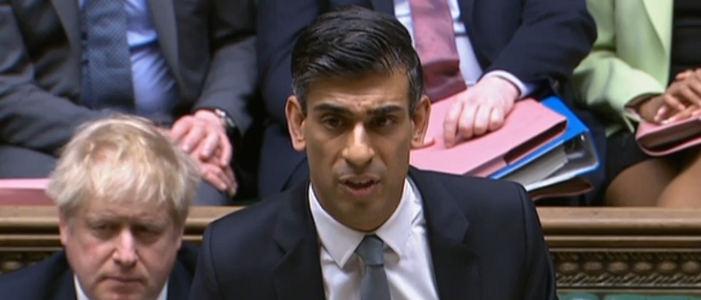The National Insurance Contribution (NIC) lower threshold will be increased by £3,000 in July to bring it into line with the Income Tax personal allowance lower limit.
However, the move has been criticised as failing to help those most in need and brought into question where funding for the NHS will come from.
The NIC threshold increase is being implemented alongside the Health and Social Care Levy of 1.25% being brought in next month that will become an increase in the NI rate from April 2023.
From July, the threshold will reach £12,570, meaning people can earn that much free of tax.
Sunak claimed this would save the typical employee over £330 a year and is projected to be worth £6.2bn in 2022-23, and a total of £25.9bn by the end of 2026-27.
“This tax cut means the UK now has some of the most generous tax thresholds in the world,” Chancellor Rishi Sunak (pictured) said.
“These tax cuts will provide meaningful support to tens of millions of people in the United Kingdom.”
However, Resolution Foundation chief executive Torsten Bell noted the change would disproportionately benefit wealthier and higher earners.
“This is a tax cut for the middle and top of the income distribution – only £1 in £3 of the benefit goes to the bottom half,” he said.
Income Tax cut
Sunak also used the Spring Statement to announce a cut to the basic rate of Income Tax from 20% to 19% in April 2024, prompting speculation it would be factored around a general election.
The cut, which Sunak said was “fully costed” is expected to cost £5.3bn in 2024-25 and a further £12bn in the following two years combined.
However, given reports that prime minister Boris Johnson is planning a general election next year there is speculation the plan is primarily an election gimmick.
Institute for Fiscal Studies director Paul Johnson was frustrated at the decisions and said workers would be those hardest hit.
He tweeted: “Oh for goodness sake. What is the possible justification for cutting the income tax rate while raising NI rate?
“Drives [a] further wedge between taxation of unearned income and earned income. Yet again benefits pensioners and those living off rents at expense of workers.”
Self-employed earn NI credits
HM Treasury confirmed that self-employed individuals with profits between the Small Profits Threshold and Lower Profits Limit will continue to build up National Insurance credits but will not pay any Class 2 NICs.
The government believes around 70% of NICs payers will pay less NICs, even after accounting for the introduction of the Health and Social Care Levy.
It added around 2.2 million people will be taken out of paying Class 1 and Class 4 NICs and the Health and Social Care Levy entirely, on top of the 6.1 million who already do not pay NICs.
